Pt 1 - David Tennant's Obscure Performances: The Remarkable Story of 'Only Human' (2002)
...straight from the pilot's author and developer!
This is the first in a five-part series about Only Human, an unaired BBC pilot made in 2002 and starring David Tennant as Tyler, a private detective who works with a virtual digital assistant called Ada. In this series of posts, we’ll be exploring the origins of the pilot and unveiling its hidden history. Stay tuned for the rest of the series!
(ETA 11/16/2024: for ease of discovery, here are the other four parts in this five-part series: Part 2, Part 3, Part 4, and Part 5.)
We’ll begin our story in a moment. But before I do, I want you to read my introductory paragraph closely. Did you notice I say it was made in 2002, not 2001…as every other resource out there about this short pilot film claims? As you will soon learn, it was indeed filmed in 2002. And this remarkable tale will prove it.
And now, on with the story!
We begin with something called BBC Imagineering. It’s not called that nowadays - it eventually became Creative R&D - but when it was officially established in mid-2000, it was the BBC’s attempt to replicate the Disney innovation model of the same name. Its intent was to capture the lightning flowering within the nascent internet: things like mixed media, interactive television, virtual worlds, and artificial intelligence. Imagineering was a cross-disciplinary think tank for convergent media and tech, and it was developed to answer a very simple question: how do we use this emerging technology to tell new stories?
And from out from this bubbling cauldron of creation sprung one of David Tennant’s obscure and unique projects: a 19:40 television pilot episode entitled Only Human.
There’s almost nothing out there about this project. It’s on David’s CV at Independent Talent and on his IMDb, and it gets a few passing mentions on Tumblr, Twitter and thereabouts. You’ll also find a two-page doc on Scribd uploaded by M. L. Zambrana called Only Human: Ahead of Its Time, which lists cast and crew and expands a little on its possible production date. The pilot gets another quick mention in a David Tennant Fact Of The Day post on 16 August 2012 about the pilot episodes David’s done throughout his career.
Other than that? Radio silence.
For something as virtually unknown as Only Human, it’s odd the whole pilot episode has been online and bouncing around from one platform to another for over a decade. At one point it appeared on both Vimeo and YouTube, but those disappeared some time ago. Right now it happens to be on Dailymotion, and if you haven’t seen it, I strongly encourage you to do so by clicking on the link in the caption in the middle of the group of photos below:
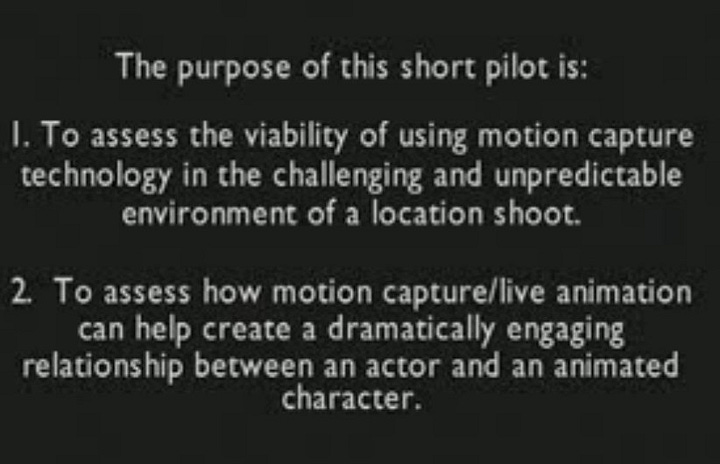
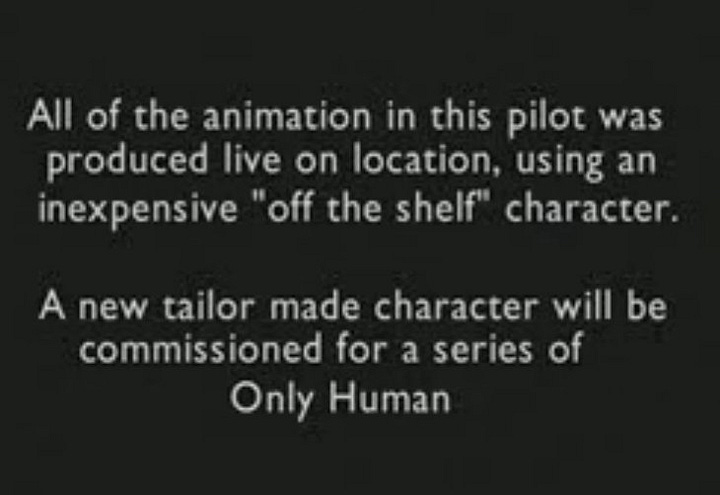
The two info blocks above are splashed across the screen before the pilot begins, and they inform us Only Human is a "short pilot" to "assess how motion capture/live animation can help create a dramatically engaging relationship between an actor and an animated character", and that "a new tailor made character will be commissioned for a series of Only Human."
At first I had no reason to doubt any of this information. But when I learned BBC Imagineering screened Only Human at a conference focusing on practical challenges of interactive media and the boundaries of artificial intelligence, I couldn’t help but wonder…was its purpose really what it said on the tin? Was it created to be a real pilot, or did it only have every appearance of one?
To satisfy my curiosity about David’s lead role in this enchantingly quirky project, I sought out two of the important players in its birth: BBC Development Executive for BBC Imagineering/Creative R&D Rowena Goldman, and its creator and author, Jim McClellan.
I’ve had the great pleasure to talk to both at length. In Jim McClellan’s case, we’ve spoken pretty much constantly for months. He’s been incredibly patient, as well as willing to dive deep into his memories to share everything with us he could recall about how Only Human came into being - even when he thought we couldn’t possibly care so much for a twenty-minute project David worked on that didn’t even go to series! (I told him he didn’t understand David’s fans…because we’re the types who really do want to know, aren’t we?) Anyway, I can’t thank him enough for it. Because of him, the origins of Only Human will no longer remain lost to time.
So without further ado, for the first time I’m excited to share the incredible, in-depth story behind the creation of Only Human. And believe me, over the five parts of this series, we’re going to be going seriously in-depth.
So buckle up!
Goldman, a screenwriter, film producer and co-founder/director (with Susan Osman) of Nick O'Time Films, was the Development Executive for BBC Imagineering in 2000. She was still in that role when she won a 2003 BAFTA for Technical Innovation for 2002’s The Dark House, an interactive BBC Radio 4 / BBC Imagineering radio drama recorded in binaural sound and written by Mike Walker. The Dark House was a ghost story told from the perspectives of the three main characters in the drama; listeners got to determine the course of the story, and from which character’s perspective it was told, by calling in, texting or going on the web and voting for their preference (if this sounds commonplace to you, keep in mind this was over twenty years ago!) If any of this piques your interest - especially considering David’s recent run in Macbeth also features binaural sound - you can listen to The Dark House at the Internet Archive, or at its producer Nick Ryan’s Soundcloud.
It was Goldman who took Only Human to the Banff New Media Institute's Artificial Stupidity/Artificial Intelligence conference on 1-4 August 2002, where it was screened during her presentation, “Learning Through Machines, Machines That Learn”, on 2 August 2002. So it was to her I put the question: was Only Human created to be an actual pilot - as it says onscreen - or was it created to appear as such to present to audiences and at conferences to gauge reaction to the idea of this tech on television?
Goldman immediately set my mind at ease. “It was a slightly dystopian sci-fi idea, yes, but it was exactly as presented. It was a pilot.”
I asked her to take me through what she could recall of the genesis of Only Human, and she explained how BBC Imagineering had been casting about for innovative ways to develop new media ideas and encourage new concepts. “I came across a writer who was writing for The Guardian newspaper and a couple of other publications, a guy [who eventually wrote Only Human] called Jim McClellan,” she explained. “We put a bit of money into developing it because we felt we could somehow possibly tell this narrative across different platforms, not just on the screen…and also, it was about her popping up.”
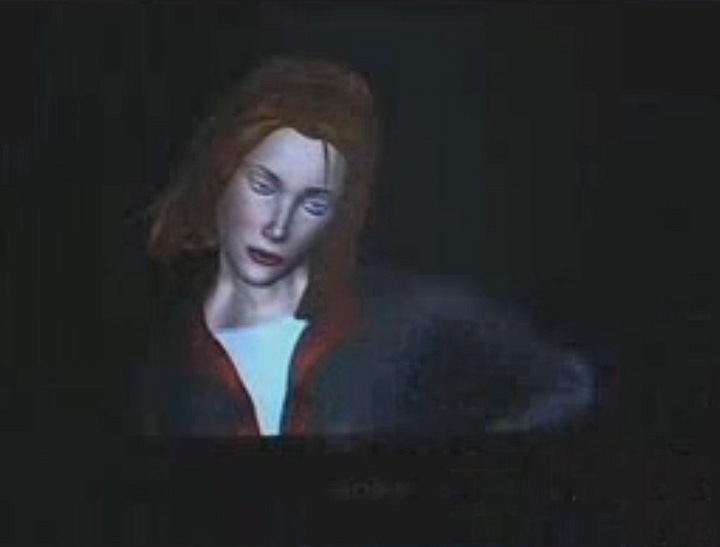
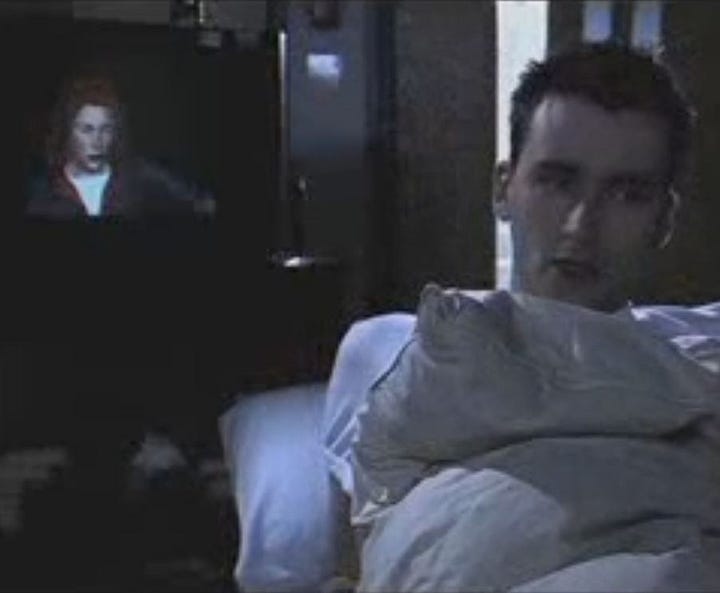
The “her” Goldman refers to is the Autonomous Digital Assistant, Version 423, aka Ada - the digital assistant who shares double-billing with David’s private detective protagonist, Tyler, in Only Human. In the pilot, Ada was played by Ruth Millar, better known as Ingrid in 2017’s Is This Now, and as Jackie Queen in Life On Mars (2006) and its sequel, Ashes To Ashes (2008). And Ada does, indeed, pop up - on Tyler’s computer screen, but also on his mobile phone and on various other screens all around London as she tracks him through a street “surveillance sub-net.” These were novel concepts at the time.
(Before we go on - it's hard to underestimate just how revolutionary all of these ideas seemed in 2000. Widespread CCTV had been in use for barely a decade. The ability to connect to the internet from a handheld device was only a few years old. Video on Demand services were just gaining their footing. And most surprising, perhaps? Nearly half of UK homes still didn’t have internet access via a PC!)
But it’s what Goldman says next which definitely piques my interest. “We found this director, a guy called Andy [Smith]. So he came on board, and we shot it with David Tennant. We did all the editing ourselves, and we had this pilot. In those days, you know, there was money sloshing around to develop fun things like this, and we took it around. And BBC Scotland were nearly going to commission it, and then they cried off.”
Wait…what?
Only Human was almost commissioned?
“Yes, it was,” Goldman confirmed, but confessed that after such a long time, she was a bit fuzzy on the specifics. She recommended I speak to its creator, Jim McClellan, who she insisted would have all the details I wanted - and more.
But before I let her go, I had to ask her: why David? “We just looked for an actor. We kind of liked his show reel, and that was it. David was a lovely guy to work with. I remember all of us thinking, what a super guy. He was a really talented, easy, non-egotistical guy…and nobody had heard of him.”
For more detail, I turned to Only Human’s author and scriptwriter, Jim McClellan, a freelance journalist and consultant who was up until recently Principal Lecturer in Journalism at the University of Westminster. McClellan, like Goldman, was surprised to hear Only Human was available to view online; when I told him it had been there for at least a decade or more on all manner of platforms, it was the first he’d heard of it. He could only shake his head in disbelief.
I asked him if he could tell me what set the wheels of Only Human in motion.
“I guess the initial idea was like, hey, can there be a relationship between a person and a computer-generated kind of intelligence? People were thinking about artificial intelligence in those days, and what it meant to say a machine was alive or conscious.
“I was a journalist back then for The Guardian and various magazines, and was writing about the early days of the web,” McClellan said. “I’d read William Gibson - I’d been interested in his work since the 1980s and of course his Neuromancer - but it was his novel Idoru (about a virtual Japanese pop idol), which was my real influence here. I’d also been reading pieces by Jaron Lanier, the virtual reality pioneer who’s also a critic of a lot of what happens in the tech business. His criticisms of social media have been influential - back then, he’d started to argue against the idea of ‘agents’, which was becoming popular in tech business circles. This was the idea you’d have an online agent who could sort things out for you, talk to you online, or sort out searches - a kind of early version of Siri or Alexa. Lanier was very skeptical that this kind of thing was an example of artificial intelligence - he used to joke that it won’t be.
“I'd also been to something called the Loebner Prize, which was where people were trying to see if early artificial intelligences and chatbots could pass the Turing Test,” he continued. “A joke that was going round at the time amongst the more skeptical people involved in this was that, in the future, it wouldn’t be that a machine would pass the Turing Test, but that people would fail it. That we will dumb down to the level of our machines.”
He went on. “So Lanier wrote quite an interesting piece about agents (and some of those ideas eventually fed into his 2011 book, You Are Not a Gadget - but what I was reading was mostly his journalism, in places like Wired). His argument was it's like we’re trying to reduce what we want to the level of what machines can give us.
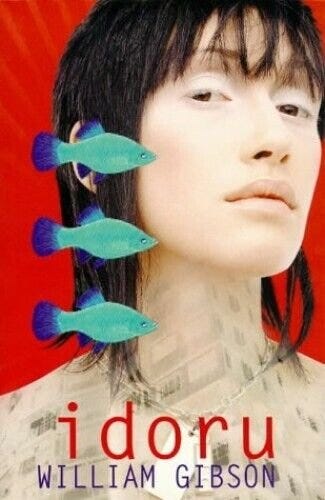
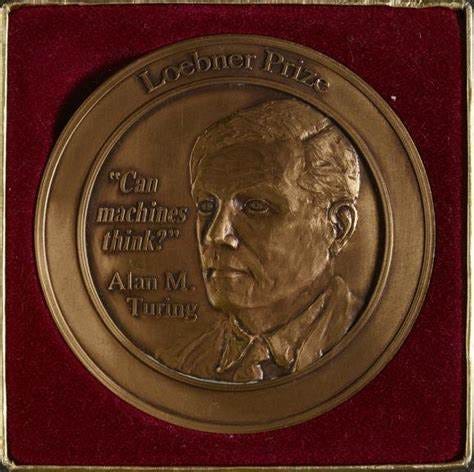
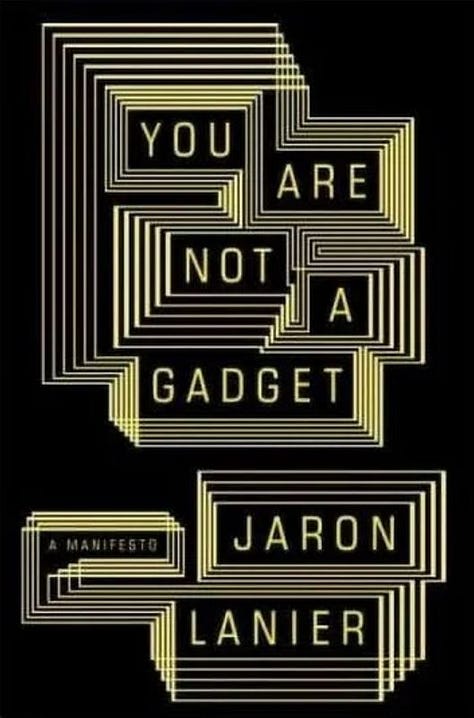
“All of those ideas were sort of floating around [in my head], and I started to wonder if you could do an interesting psychological drama about someone puzzling over whether a machine is alive, or whether they're projecting lifelike features onto them, or whether they're acting a bit inhuman in their own kind of ways. Those were the kind of ideas I was feeding into it."
But McClellan’s ideas weren’t completely developed yet. They really began to gel when Imagineering - which began its soft launch in 1999, six to nine months before its official launch - commissioned a project McClellan helped create called Hot Links for BBC Choice (later BBC3). Hot Links was aimed at young people to tell them what was happening each week, and was presented by an actress mocked up with computer animation to look virtual.
Hot Links only lasted from March to September 2000, but it was to prove essential to the development of Only Human. BBC Imagineering's brief was to use new tech to get the rest of the BBC interested in using the web in traditional TV projects. After the success of Hot Links, it was keen for more virtual character projects to build on. They liked McClellan’s work, and wanted to keep working with him.
So, McClellan (who in the interim had worked on Mr. B, a web-only character who helped guide watchers to interesting online content) and the fledgling department came together once more to bounce around ideas for a new project. What ended up bouncing to the top was that psychological drama of man and machine he’d been thinking and writing about. He’d long wanted to explore whether it was possible a human character might be able to interact in real time with a generated motion capture character, on location, with portable sets. And by 2001, Imagineering was willing to explore it, too.
When creating the pilot of Only Human became a possibility, McClellan and Goldman secured the services of production manager/director Andrew Smith. “She [Goldman] brought in Andy because Andy had a lot of experience,” McClellan explained. “He’d directed some really high profile sitcoms in the UK and had experience working with actors and sets, but he'd also done a little bit of motion capture work.”
During November and December of 2001, McClellan and Smith worked together to write the script and cast the pilot with the seed money from BBC Imagineering. A casting director sent the pair about twenty different leads for the Tyler and Ada roles, so they were flush with options. McClellan told me they went through them, picked three possibilities for each role, and got in touch. For the role of Tyler, David was one of those three.
One of the reasons McClellan and Smith liked David so much for the role was because he was quite clearly eager to dip his toes into a tech-based, science fiction-style world. Not all the actors they spoke with were as open-minded or enthusiastic about the project.
“We didn't really do auditions, you see,” McClellan explained. “We sort of just met people for a coffee and explained it, and if they didn't laugh at us outright and say, ‘What on earth are you doing?’ we thought, well, okay! But as soon as we met David, we knew we should do it with him, because he was such a nice guy and so enthusiastic and keen. One of the people we’d picked had a higher profile than David did at the time. But we just really liked David.”
David had been approached for Only Human at the perfect time. He’d spent most of the months of September and October 2001 in Exeter and Oxford, rehearsing (and then touring for) his run as Gethin Price in the Sean Holmes-directed revival of Comedians.
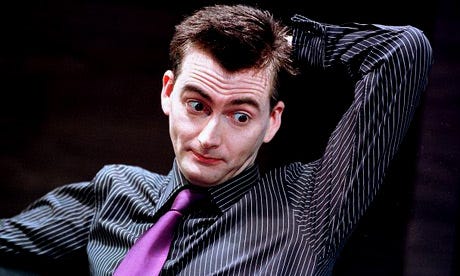

When a speculated West End transfer for Comedians didn’t happen, David took the role of Robert in Roland Schimmelpfennig’s play, Push Up. A ninety-minute vignette-style piece about the murky politics of office life in the corporate jungle consisting of three dialogues between rivals in a firm, it would kick off the Royal Court’s third International Playwrights Season. The play was directed by Ramin Gray and was set to premiere at the Court’s Jerwood Theatre Upstairs in February of 2002.
But Push Up wouldn’t start its rehearsals until sometime in January. In the interim? David was open and looking for other offers.
And then?
Along came Only Human.
Next time (which you won’t have to wait long for, as it’s coming in only a few days!) we go behind the scenes of the Only Human shoot to learn how it was done, where it was shot and when, and what happened afterwards. Exclusive pics,
Be sure you’re subscribed, so you can follow along with us as the rest of the story is revealed!
ONLY HUMAN
Concept & Script Devised & Developed by JIM MCCLELLAN & ANDREW SMITH
CAST
Ada - RUTH MILLAR
Tyler - DAVID TENNANT
Hannah - JANE FORSHAW
Woman On Laptop - RUTH MILLAR
Sally Soames (voice) - SOPHIE CASH
Bartender - JIM MCCLELLAN
CREW
Animation Modeling - DANNY POPKIN
Motion Capture Systems Supplied by Vicon Engineering
Motion Capture Support - DANNY POPKIN & QUENTIN PLANT
Casting Advisor - CHLOE EMMERSON
Runner - AMY CASH
Designer - SUE TANNER
Director of Photography - PETER EDWARDS
Camera Assistant - STEPHEN DOBSON
Sound - CHRIS ASHWORTH
Editor - STUART ELLIOTT
Production Co-ordinator - NIKKI HOLY
Production Manager - SOPHIE CASH
Development Executive - ROWENA GOLDMAN
Production - JIM MCCLELLAN & ANDREW SMITH
—
‘Only Human’ images courtesy of Jim McClellan (c) 2024. A Tennantcy To Act/Patricia Browning. All rights reserved.






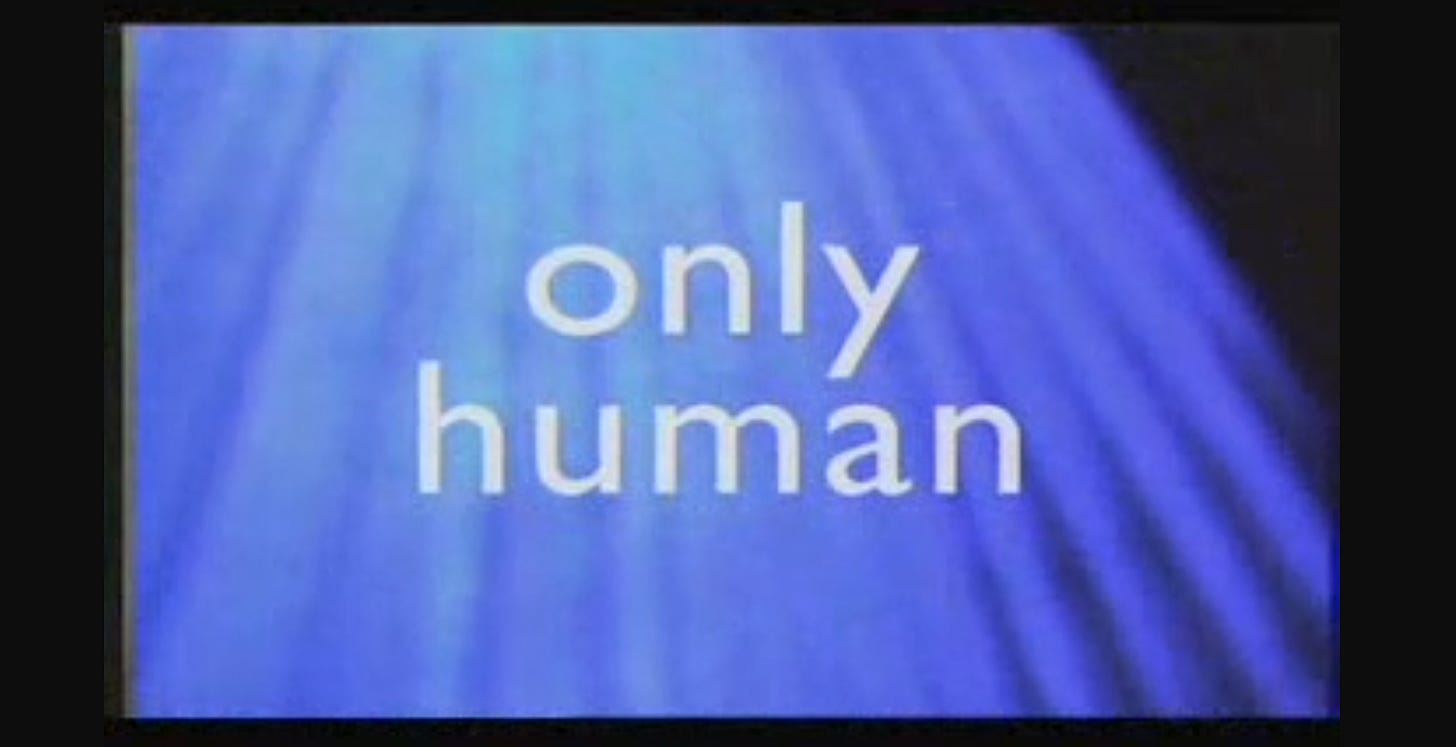
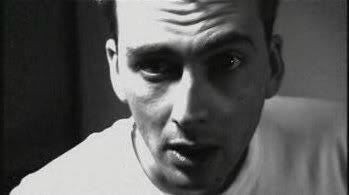
Watching it reminded me of the movie Her from 2013, although I don't find David's performance slightly more cynical and rough. It has a Christopher Ecclestoness to it , not only the clothes but the emotional delivery feel blunt, almost brutal in comparison with everything else I've seen of David's early work.
Having watched Only Human once-through, not only was watching a young DT acting in a role that was utilizing new technology a treat for the senses, but the backstory is proving to be fascinating as well. I was not aware of him until I saw him as Doctor Who, when that series began playing on BBC America. And he was singularly riveting to behold then. Thank you for being such a gifted researcher and writer.